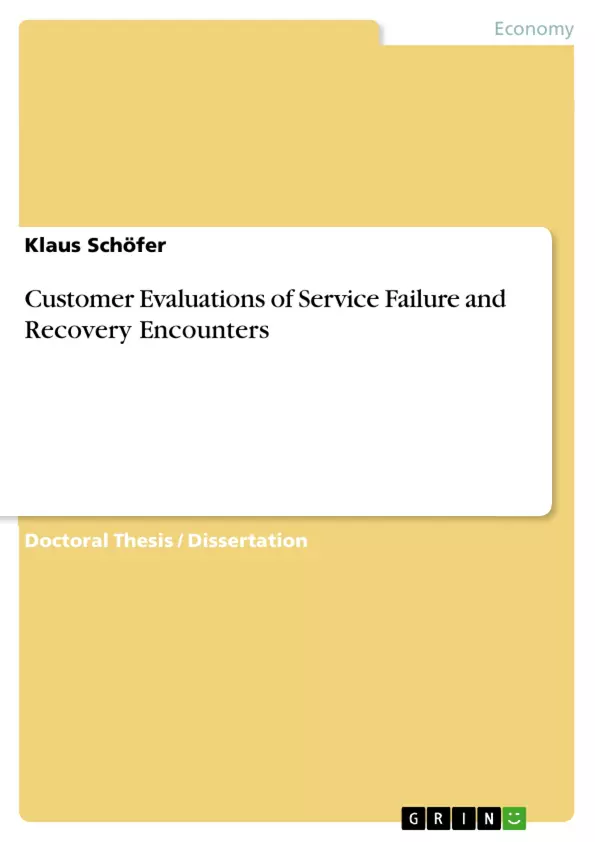Although there is a substantial literature on customer (dis)satisfaction and complaining behaviour, relatively little progress has been made in developing a theoretical understanding of how consumer evaluate a companys response to service failure and ... Die Arbeit erhielt den ITB Wissenschaftspreis 2004
Inhaltsverzeichnis (Table of Contents)
- Abstract
- List of Figures
- List of Tables
- Chapter 1: Introduction
- 1.1 Background
- 1.2 Problem Statement
- 1.3 Research Objectives
- 1.4 Research Questions
- 1.5 Research Design and Methodology
- 1.6 Overview of the Thesis
- Chapter 2: Literature Review
- 2.1 Customer (Dis)satisfaction and Complaining Behaviour
- 2.2 Service Failure and Recovery Encounters
- 2.3 The Role of Perceived Justice in Customer Evaluations of Service Failure and Recovery Encounters
- 2.4 Summary and Discussion
- Chapter 3: Theoretical Framework
- 3.1 Perceived Justice Theory
- 3.2 The Conceptual Model of Customer Evaluations of Service Failure and Recovery Encounters
- 3.3 Summary and Discussion
- Chapter 4: Research Design and Methodology
- 4.1 Research Strategy
- 4.2 Data Collection
- 4.3 Measurement Instruments
- 4.4 Data Analysis
- 4.5 Summary and Discussion
- Chapter 5: The Travel and Tourism Industry
- 5.1 Introduction
- 5.2 The Characteristics of the Travel and Tourism Industry
- 5.3 The Impact of Service Failure and Recovery Encounters on the Travel and Tourism Industry
- 5.4 Summary and Discussion
- Chapter 6: Research Findings
- 6.1 Introduction
- 6.2 Descriptive Statistics
- 6.3 Reliability Analysis
- 6.4 Confirmatory Factor Analysis
- 6.5 Summary and Discussion
- Chapter 7: Hypothesis Testing
- 7.1 Introduction
- 7.2 Path Analysis
- 7.3 Summary and Discussion
- Chapter 8: Discussion
- 8.1 Introduction
- 8.2 Theoretical Implications
- 8.3 Managerial Implications
- 8.4 Limitations of the Study
- 8.5 Directions for Future Research
- 8.6 Summary and Conclusion
Zielsetzung und Themenschwerpunkte (Objectives and Key Themes)
This study aims to develop and test a model that explains how customers evaluate service failure and recovery encounters in the travel and tourism industry. It investigates the relationship between perceived justice evaluations, customer satisfaction, and subsequent post-purchase behavior and attitudes. The key themes of this research include:- Customer evaluations of service failure and recovery encounters
- Perceived justice theory
- The role of emotions in customer satisfaction
- Post-purchase behavior and attitudes
- The travel and tourism industry
Zusammenfassung der Kapitel (Chapter Summaries)
Chapter 1: Introduction provides an overview of the research topic, outlining the problem statement, research objectives, and research questions. It also presents the research design and methodology, and a brief outline of the thesis structure.
Chapter 2: Literature Review explores existing literature on customer satisfaction, complaining behavior, service failure and recovery encounters, and the role of perceived justice in customer evaluations. It discusses various theoretical frameworks relevant to the research topic.
Chapter 3: Theoretical Framework presents the conceptual model of customer evaluations of service failure and recovery encounters. It explains the application of perceived justice theory to understand customer judgments in such situations.
Chapter 4: Research Design and Methodology outlines the research strategy, data collection methods, measurement instruments, and data analysis techniques employed in the study. It describes the specific approach used to gather and analyze data.
Chapter 5: The Travel and Tourism Industry provides an overview of the characteristics of the travel and tourism industry and its susceptibility to service failures. It discusses the impact of service failure and recovery encounters on customer satisfaction and loyalty within this industry.
Chapter 6: Research Findings presents the results of the study, including descriptive statistics, reliability analysis, confirmatory factor analysis, and other relevant findings. It summarizes the data analysis and key findings related to the conceptual model.
Chapter 7: Hypothesis Testing focuses on testing the hypotheses proposed by the conceptual model. It applies path analysis to examine the relationships between variables and determine the extent to which the model is supported by the empirical data.
Schlüsselwörter (Keywords)
The main keywords and focus topics of this dissertation include customer satisfaction, service failure, service recovery, perceived justice, customer evaluations, post-purchase behavior, travel and tourism, and empirical research. It explores the role of perceived justice in shaping customer judgments and influencing their subsequent behavior within the context of service failure and recovery encounters in the travel and tourism industry.Frequently Asked Questions
What is the focus of this research on service failure?
The study focuses on how customers evaluate a company’s response to service failure and recovery encounters, specifically within the travel and tourism industry.
What is Perceived Justice Theory in this context?
Perceived Justice Theory is the theoretical framework used to understand how customers judge the fairness of a company's recovery efforts after a service failure has occurred.
How do emotions influence customer satisfaction?
The research investigates the role of emotions as a mediator in the relationship between perceived justice and overall customer satisfaction during recovery encounters.
Why is the travel and tourism industry particularly susceptible to service failures?
The industry is characterized by high levels of human interaction and complex service chains, which increases the likelihood of errors and the impact of failures on customer loyalty.
What are the practical implications for managers?
The study provides insights into developing effective service recovery strategies that enhance customer satisfaction and prevent negative post-purchase behaviors like complaining or switching brands.
- Citar trabajo
- Dr. Klaus Schöfer (Autor), 2002, Customer Evaluations of Service Failure and Recovery Encounters, Múnich, GRIN Verlag, https://www.grin.com/document/185871



